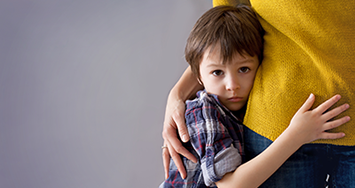
Anxiety
We offer effective treatments for kids & teens presenting with different forms of anxiety including worry, social anxiety, separation anxiety, specific fears, and OCD. Sometimes, anxiety symptoms can also lead to school refusal. Typically, our providers utilize a cognitive behavior therapy (CBT) approach and include parents in the treatment process.

Trauma
Both providers have extensive experience treating traumatized youth. Although there are several options for treating posttraumatic stress disorder (PTSD) in children, we typically recommend Trauma-Focused Cognitive Behavior Therapy (TF-CBT) as the first line treatment. TF-CBT focuses on building skills which are used to help kids cope with and process what they experienced. Parent involvement in treatment is often highly beneficial to the child’s outcomes.

Adjustment Problems
Adjustment problems are common responses to specific stressors or changes in your child’s life. Some signs that your child may be experiencing an adjustment disorder include depression, anxiety, acting out, or complaining about feeling sick more than usual. Treatment focuses on using cognitive behavior therapy (CBT) approaches to help them build coping skills, express how they are feeling to others, and providing support.

Social Difficulties
There are a lot of reasons kids may be struggling socially. Some kids feel anxious around peers, while others need more help in learning age appropriate ways to interact with other kids. Therefore, treatment may incorporate teaching social skills, learning ways to manage social anxiety, increasing flexibility in interactions with others, and finding creative ways to build positive relationships with peers.

Behavior Problems
Behavior problems have a wide variety of causes. Therefore, we would first want to take some time to understand what is driving the disruptive behaviors. Specific strategies may include behavior therapy techniques, family therapy, and work with the parents to experiment with new approaches for managing their child’s behaviors.

Mood Disorders
Persistent sadness or mood swings can be a normal part of development. But, sometimes, they are signs of a more serious issue. They can also affect relationships, school performance, self-esteem, and an overall ability to function. Our providers rely on cognitive-behavior therapy (CBT) for building emotion regulation and coping skills, enhancing self-worth, and improving communication skills.

Academic Support
For students struggling academically in school, there are a variety of tools that can be used to improve their performance. Skill building strategies might focus on improving time management, organization, self-advocacy, study skills, and other services. In addition, our providers are happy to consult with your child’s school as needed.

ADHD
Attention-Deficit/Hyperactivity Disorder, or ADHD, often brings academic struggles and behavior problems as part of the disorder. The most effective treatment is a combination of medications and therapeutic approaches. For therapy, research supports working with parents to learn new ways of managing their child’s behavior, as the symptoms can be frustrating and challenging to handle. With the child, treatment focuses on building academic & organizational skills, implementing appropriate supports in school, and learning coping skills.